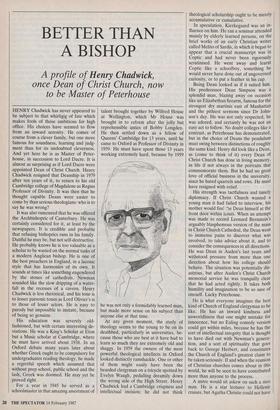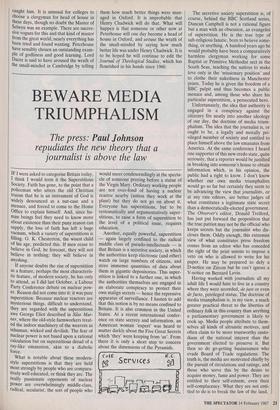BETTER THAN A BISHOP
A profile of Henry Chadwick,
once Dean of Christ Church, now to be Master of Peterhouse
HENRY Chadwick has never appeared to be subject to that whirligig of fate which makes fools of those ambitious for high office. His choices have seemed to flow from an inward serenity. He comes of course from a clever family, but one more famous for soundness, learning and judg- ment than for its undoubted cleverness. And yet here he is as Master of Peter- house, in succession to Lord Dacre. It is almost as surprising as if Lord Dacre were appointed Dean of Christ Church. Henry Chadwick resigned that Deanship in 1979 after ten years of it, to return to his old Cambridge college of Magdalene as Regius Professor of Divinity. It was then that he thought capable Deans were easier to come by than serious theologians: who is to say he was wrong?
It was also rumoured that he was offered the Archbishopric of Canterbury. He was certainly considered for it, at least by the newspapers. It is credible and probable that refusing bishoprics runs in his family. Dutiful he may be, but not self-destructive. He probably knows he is too valuable as a scholar to be wasted on the normal tasks of a modern Anglican bishop. He is one of the best preachers in England, in a laconic style that has harmonies of its own. It sounds at times like something engendered by the stones of cathedrals. Newman sounded like the slow dripping of a water- fall in the recesses of a cavern. Henry Chadwick is less rhetorical, and his tone is to lesser parsonic tones as Lord Olivier's is to those of lesser actors. He is easy to parody but impossible to imitate, because of being so genuine.
His education was severely old- fashioned, but with certain interesting de- viations. He was a King's Scholar at Eton but a Music scholar at Cambridge, where he must have arrived about 1938. In an Oxford debate many years later about whether Greek ought to be compulsory for undergraduates reading theology, he made a regretful speech which assumed that without prep school, public school and the lash, Greek was doomed. He may yet be proved right.
For a year in 1945 he served as a schoolmaster in that amazing assortment of talent brought together by Wilfred House at Wellington, which Mr House was brought in to reform after the jolly but reprehensible antics of Bobby Longden. He then settled down as a fellow of Queens' Cambridge for 13 years, until he came to Oxford as Professor of Divinity in 1959. He must have spent those 13 years working extremely hard, because by 1959 he was not only a formidably learned man, but made more sense on his subject than anyone else at that time.
At any given moment, the study of theology seems to the young to be on its deathbed, particularly in universities, be- cause those who are best at it have had to learn so much they are extremely old and shaggy. In 1959 the owners of the most powerful theological intellects in Oxford looked distinctly ramshackle. One or other of them might easily have been the bearded clergyman on a tricycle spotted by Evelyn Waugh, pedalling dreamily down the wrong side of the High Street. Henry Chadwick had a Cambridge crispness and intellectual incision; he did not think theological scholarship ought to be merely accumulative or cumulative.
In speculation, Kierkegaard was an in- fluence on him. He ran a seminar attended mainly by elderly learned persons, on the brief works of an early Christian writer called Melito of Sardis, in which it began to appear that a crucial manuscript was in Coptic and had never been rigorously scrutinised. He went away and learnt Coptic like a schoolboy, something he would never have done out of ungoverned curiosity, or to put a feather in his cap. Being Dean looked as if it suited him.
His predecessor Dean Simpson was a splendid man, blazing away on occasion like an Elizabethan firearm, famous for the strongest dry martinis east of Manhattan and the pithiest sermons since Dr John- son's day. He was not only respected, he was adored, and certainly he was not an easy act to follow. No doubt colleges like a contrast, as Peterhouse has demonstrated, but in the choice of Deans the pendulum must swing between distinctions of roughly the same kind. Henry did look like a Dean, as (come to think of it) every Dean of Christ Church has done in living memory, in life if not always in the portraits that commemorate them. But he had no great love of official business in the university, since he hated quarrels and rows. He must have resigned with relief.
His strength was tactfulness and timely diplomacy. If Christ Church wanted a young man it had failed to interview, his mother would find the Dean himself at the front door within hours. When an attempt was made to record Leonard Bernstein's arguably blasphemous version of the mass in Christ Church Cathedral, the Dean went to immense pains to discover what was involved, to take advice about it, and to consider the consequences in all directions. He was Dean in Auden's last years and withstood pressure from more than one direction about how his college should behave. The situation was potentially dis- astrous, but after Auden's Christ Church memorial service he was tranquilly clear that he had acted rightly. It takes both humility and imagination to be so sure of oneself. Lucky Peterhouse.
He is what everyone imagines the best kind of Church of England clergyman to be like. He has an inward kindness and unworldliness that one might mistake for innocence, but no Ealing comedy version could get within miles, because he has the sort of intellectual integrity that is thought to have died out with Newman's genera- tion, and a sort of spirituality that goes back to George Herbert, and constitutes the Church of England's greatest claim to be taken seriously. If and when the reunion of Christian churches comes about in this world, he will be seen to have contributed more than anyone to the process.
A mitre would sit askew on such a nice man. He is a star lecturer to Hellenic cruises, but Agatha Christie could not have caught him. It is unusual for colleges to choose a clergyman for head of house in these days, though no doubt the Master of Selwyn was an example. There are succes- sive vogues for this and that kind of master from the great world; nearly everything has been tried and found wanting. Peterhouse have sensibly chosen an outstanding exam- ple of godliness and good learning. Lord Dacre is said to have aroused the wrath of the small-minded in Cambridge by telling them how much better things were man- aged in Oxford. It is improbable that Henry Chadwick will do that. What will happen is that someone or other now at Peterhouse will one day become a head of house in Oxford, and arouse the wrath of the small-minded by saying how much better life was under Henry Chadwick. It is to be hoped he will continue to edit the Journal of Theological Studies, which has flourished in his hands since 1960.



























































 Previous page
Previous page